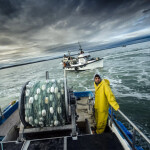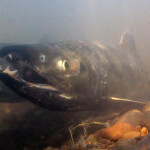The last couple of years have been terrible for Japanese squid processors and fishermen.
The national catch of Pacific flying squid fell to around 53,000 metric tons (MT) in 2017, and the 2018 haul hit a low of 41,700 MT. For comparison, 670,000 MT were landed in 2006, and about 200,000 MT were caught in 2011.
This year is shaping up to be slightly better. Landings from January to August in major ports nationwide increased 15 percent year-on-year. The catch has increased from Iwate prefecture north to Aomori Prefecture. In Aomori Prefecture’s Hachinohe Port in the second half of August, landings were 70 percent more than during the same period last year.
The wholesale price at Toyosu Market at the end of August ranged from JPY 648 (USD 6.06, EUR 5.50) to 799 (USD 7.47, EUR 6.78) per kilogram. A year ago, prices were between JPY 605 (USD 5.66, EUR 5.13) and 821 (USD 7.68, EUR 6.96).
Severe conditions continue in Hakodate City, Hokkaido, a famous squid processing port. Fresh squid landings from June to August were 229 MT, less than half of last year's record low. The local wholesale price is JPY 882 (USD 8.25, EUR 7.48) per kilogram.
Squid are born south of Kyushu Island and mature while moving north. The fishery is active from summer to late autumn.
In recent years, water temperatures in the squid breeding grounds in the East China Sea have been lower than usual, leading to a lower survival rate. In the north, waters remain warm too long, prompting squid to continue further to the northeast – out of Japan’s exclusive economic area (EEZ) and into international waters where they are targeted by Chinese and Taiwanese vessels. This has been a trend in recent years, with generally warmer ocean surface temperatures delaying the migrations of other important species like Pacific saury as well.
Fresh squid for sashimi can command a high price, but processors have been hit harder. As Japanese are used to paying low prices for processed dried squid snacks, popular as an accompaniment for beer, the makers of these products have been unable to pass on higher prices to consumers. This year is an improvement on last year, but they remain hard pressed.
Photo courtesy of Shutterstock







